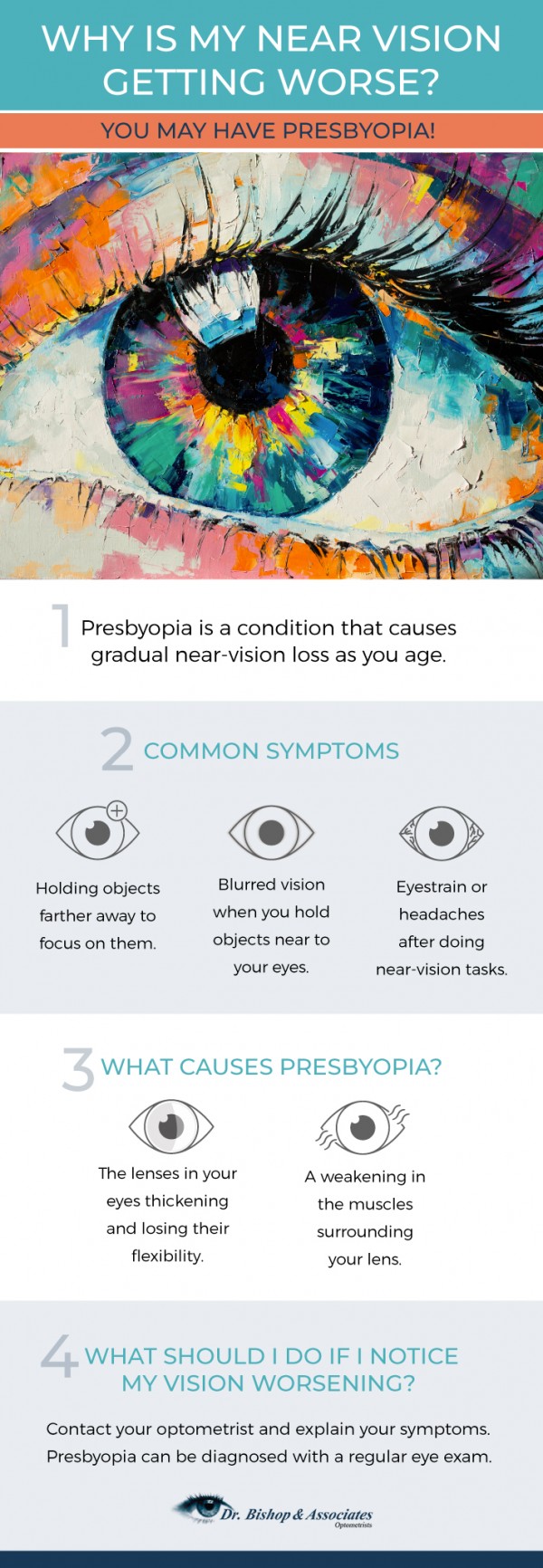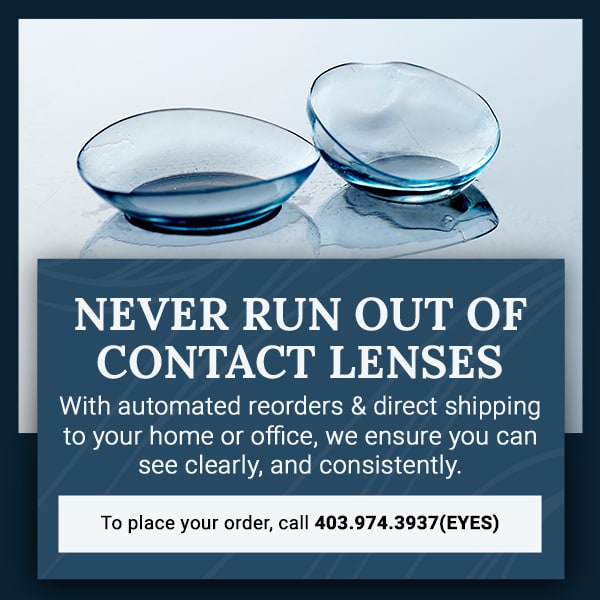Are you finding it difficult to read? Do you find that you have to hold your phone further away from your face to see what you’re doing? If so, it’s probably because your near vision is getting worse.
If you’ve noticed that your near vision is declining, you should know it is an entirely normal part of ageing. In fact, approximately 62% of people notice this as they age.
If you are concerned about your changing eyesight, book an appointment with your eye doctor. You should get an eye exam yearly to track your eyesight as you age and learn how to care for your vision and protect your eyesight.
What is Presbyopia?
Presbyopia is a condition that causes vision loss. Although it affects vision as a whole, It is defined as the gradual loss of the ability to focus on near-vision objects in particular.
Presbyopia typically becomes noticeable when you reach your early-to-mid 40’s and tends to worsen over time.
If you have presbyopia, you may notice that it is getting more and more challenging to focus on objects close to your eyes. As a result, you may start holding objects at a farther distance to see them.
Presbyopia Symptoms
Presbyopia develops gradually, so you may not notice symptoms right away or all the time. Presbyopia tends to be worse if you are tired or are in an environment with low lighting.
The symptoms you can watch for include:
- A tendency to hold objects farther away to focus on them
- Blurred vision when you hold objects near to your eyes
- Eyestrain or headaches after doing near vision tasks such as reading
When Should I See an Optometrist?
Presbyopia can be diagnosed with an eye exam. If you are experiencing any of the above symptoms, book an appointment with your optometrist to discuss treatment options.
Although presbyopia is not a serious condition, you should seek immediate medical attention if you:
- Lose vision in one or both eyes
- Have sudden or severe blurred vision
- Have double vision
- See flashes of light, black spots or halos

What Causes Presbyopia?
As you age, the lenses in your eyes begin to thicken and lose their flexibility. Unfortunately, this means that your lens can’t focus on objects at varying distances as it’s supposed to. This can make close objects appear blurry.
In addition to this, presbyopia can also be caused by a weakening in the muscles surrounding your lens. Usually, this muscle expands or contracts to help the eye focus, but as it weakens, it may not work as efficiently as before.
Presbyopia Risk Factors
Although presbyopia affects most individuals as they age, certain risk factors can increase your chances of developing presbyopia. These include:
- Smoking: Smoking can lead to medical conditions that affect your eyesight, increasing your risk of developing presbyopia.
- Medical conditions: Certain medical conditions such as farsightedness, diabetes, or cardiovascular diseases can increase your risk of developing presbyopia earlier.
- Medications: Certain medications such as antidepressants, antihistamines, and diuretics have been linked to premature presbyopic symptoms.
How Is Presbyopia Treated?
There are a few different options for treating presbyopia. If your optometrist diagnoses you with presbyopia, they may recommend any of the following treatments:
- Glasses or contact lenses: If you’ve never needed glasses, corrective eyewear may be a promising treatment option for you. If you previously wore glasses, you will need a new prescription to treat your presbyopia.
- Surgery: If you don’t want to wear corrective eyewear, your optometrist may recommend laser eye surgery to reshape your cornea.
- Eye drops: Although not yet available, several kinds of eye drops designed to manage the symptoms of presbyopia are going through FDA approval. These brands include Allergan, Presbyopia Therapies and Orasis Pharmaceuticals and work by contracting parts of the eye to help it focus on objects properly.
What Should I Do if I Notice My Vision Worsening?
If you notice that your near vision is worsening or you are experiencing any of the symptoms previously outlined, you should book an appointment with your optometrist.
How can I Protect My Vision as I Age?
Even though presbyopia isn’t preventable, there are steps you can take to prolong healthy eyesight. These include:
- Wear sunglasses to protect your eyes from sun damage
- Stop smoking
- Follow a healthy diet
- Be physically active and maintain a healthy weight
- Follow the 20-20-20 rule when doing near vision tasks
If you have any additional questions about presbyopia or your eye health in general, contact us at Dr. Bishop & Associates today!




